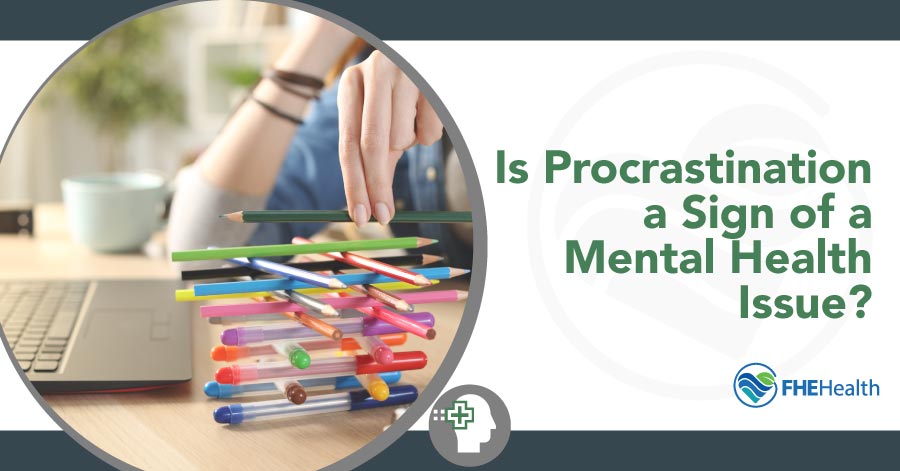
Procrastination is something that happens to everyone at some point. Whether it’s letting the dishes pile up in the sink, pushing the grocery shopping to another day, or waiting until the last minute to prep for a presentation at work, it’s normal to put off things we don’t want to do. But when is procrastination a mental illness? In some cases, procrastination can be a sign that there’s a larger mental health issue that needs to be addressed. Keep reading to find out what procrastination can be and how to get help if it’s negatively affecting your life.
Is Procrastination a Mental Illness?
Procrastination in and of itself isn’t a mental illness, and there’s no mental health diagnosis based solely on procrastination. Procrastination is extremely common and something many people struggle with from time to time. By itself, it’s not a sign of any mental health disorders, and most procrastination can be explained by the pure fact that people avoid unpleasant, boring, or difficult tasks.
However, if procrastination is happening with everyday life tasks, such as showering or texting someone you have a good relationship with, and there are other issues, it may be a sign of a larger problem. Below are some common symptoms of mental health disorders that may present with procrastination:
- Feeling overwhelmed all the time
- Experience signs of burnout
- Difficulty sleeping or sleeping all the time
- Changes in eating habits
- Feeling anxious or worried
- Mood swings
- Substance abuse
- Problems maintaining close relationships
If you’re struggling with procrastination and experiencing any of the issues above, it’s important to consider that you may not be dealing with a minor motivation problem.
Common Mental Health Disorders That May Include Procrastination
Below, we cover a few of the more common mental health disorders and how procrastination can manifest in these specific disorders.
Depression
Depression is a word that gets tossed around a lot by people, but it’s a mental health disorder: major depressive disorder. One of the main symptoms of depression is apathy, which can manifest as a lack of motivation or a loss of interest in things you once found enjoyable. This can often come out in procrastination tendencies, as it can be difficult to find the energy to complete even simple tasks when you are experiencing depression.
Anxiety
Anxiety is an emotion and something many people feel at some point in their lives, but when it’s chronic and interferes with your quality of life, it may be an indicator that you have an underlying anxiety disorder. Several disorders fall under the umbrella of anxiety disorders, including:
- Generalized anxiety disorder
- Panic disorder
- Obsessive-compulsive disorder
- Phobic disorders, such as agoraphobia
If you experience anxiety about doing a task, this can contribute to procrastination. For example, if you have anxiety about going out in public or being around large crowds of people, you may procrastinate doing the grocery shopping or getting the oil changed in your car.
Bipolar Disorder
Bipolar disorder is a rare but serious mental health disorder that affects approximately 4.4% of the population. It has three main subtypes and is characterized by mood swings known as manic and depressive episodes.
Procrastination can manifest in those with bipolar disorder in both manic and depressive states. In a depressive state, the person may have the same apathy and lack of motivation to do anything that happens in those with depression. However, procrastination can also happen in a manic state because the person may be very focused on some actions while completely neglecting others.
Personality Disorders
Personality disorders are a category many mental health diagnoses fall into. Some of the more common ones include:
- Borderline personality disorder
- Histrionic personality disorder
- Avoidant personality disorder
- Narcissistic personality disorder
- Antisocial personality disorder
The category of personality disorders is wide, and individual disorders can present with a variety of symptoms, many of which can trigger or exacerbate procrastination.
What Can You Do About Chronic Procrastination?
If your procrastination problem is a symptom of a mental health disorder, taking action to get that disorder managed is the first step. Talking with your doctor or a trained mental health professional can help you better understand what might be going on and get started with a treatment plan.
But what if your procrastination isn’t related to a mental illness? In this scenario, procrastination can often be managed with some lifestyle changes and behavioral adjustments. For example, many people find it helpful to do the hardest or least enjoyable task first on their daily list. This immediately gives you a big win and ensures you don’t keep pushing it off until the last minute.
Staying organized through lists — whether you prefer old-fashioned pen and paper or a digital planner that syncs across all your devices — can also help. Consider strategies such as color-coding your to-do list by tasks that need to be done right away, those that can wait a day or two and those that need to be done by the end of the week. This can be especially helpful for those who process things better visually.
Relying on a support system for encouragement and accountability is also important. It can help to find a friend who’s also struggling with procrastination and willing to do regular check-ins. You can tell each other what you’re planning on doing and by when and then follow up to make sure it actually got done.
When It’s Time To Seek Professional Help
Procrastination may not be something you can ever completely erase from your life, particularly if it’s a symptom of a mental health disorder. But that doesn’t mean you just have to live with it. If procrastination is negatively affecting your life and your own attempts at change haven’t been successful, talking with a therapist can help. At FHE, our team can help determine what’s contributing to your procrastination tendencies and give you a plan to start moving forward.






